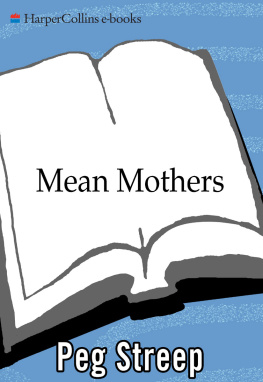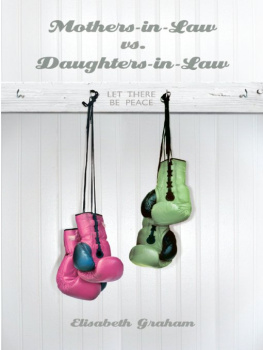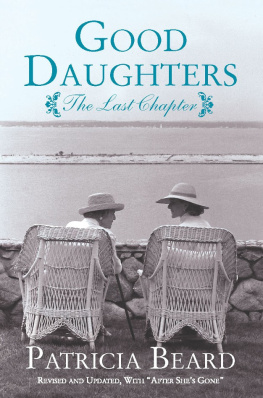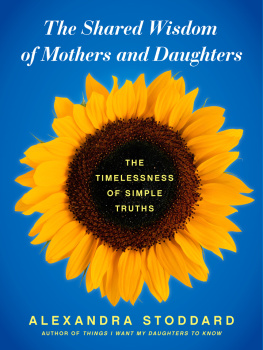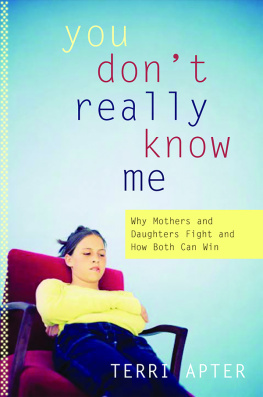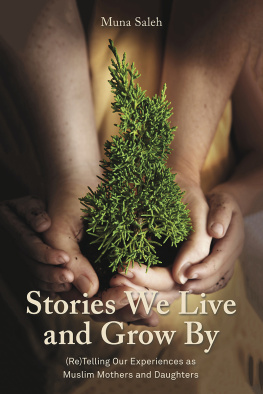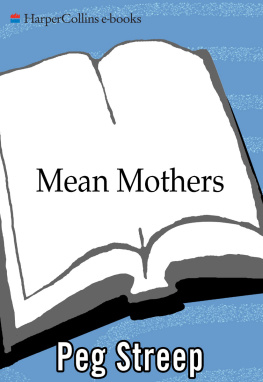Rachel Harris, Ph.D.
Contents
by Rachel Harris, Ph.D.
The Myth of Mother Love
My Mother and Her Mother Before Her: Patterns Old and New
In the House of the Father: Heroes and Coconspirators
Siblings and Other Rivalries
Stilling the Voice of the Mother Within: The Battle for Self-Worth
Turning the Wheel: Mothering the Next Generation
A Coda
by Rachel Harris, Ph.D.
P SYCHOTHERAPISTS MAY DISAGREE, EVEN VEHEMENTLY, ABOUT THEORY or practice, but we all agree on the mothers central importance in a womans life. From day one, or even before as some perinatal psychologists believe, the mothers capacity to be empathic and responsive to her baby will shape the very architecture of her daughters developing brain. This is just the beginning of the mothers impact on a daughters life.
After almost forty years of private practice, I still listen for the most important clue in a new clients history Did she feel loved as a child? I never ask this question directly because its too difficult to admit that No, my mother didnt love me. Even adults who were abused as children may feel that they were loved, although during the course of therapy they may come to reconsider their answer, while others who didnt feel loved may eventually appreciate that their mothers were too damaged to be able to love anyone. Ultimately, this seemingly simple question is more complex than it might appear.
Mean Mothers asks the very same question and explores the lives of women who are able to say that they were not loved well enough or even that their mothers were mean. How these women understand their mothers impact on their lives will enlighten all of us, no matter how we perceive our mothers.
Peg Streep weaves the latest psychological research into her exploration of mean mothers within the context of the whole familythe mean mothers relationship with her mother, the role of the father, and how other siblings were treated. There are no simple answers here. Family dynamics are such a complex mix of personality, genetics, and environment that it is impossible to define the impact of a mean mother in simple terms. Streep uses personal stories from many women to deepen our understanding of mean mothers and to arrive at a place of hope, if not reconciliation. Hope resides ultimately in the daughter and how she chooses to live her life, and not in her relationship with her mother.
Along the way, Streep shares her own experiences with a mean mother and how she grew to understand that she is both worthy of being loved and capable of being a loving mother. It is perhaps by becoming a loving mother that Streep both frees herself from her own mother and surpasses her in this ultimate challenge. It requires persistent courage and hard work for an unloved girl to grow up to become a loving mother, and its not an easy journey. Yet it is the greatest life task to have the awareness and compassion not to pass on the legacy of familial dysfunction to the next generation. This is the achievement of the author and the book.
The opportunity for the reader is, first of all, to learn that she is not alone if she has had a mother whos been less than loving. If she has the courage to explore the possibility of Mean Mothers , she will find good company in the many intimate examples of other women struggling with their legacy of hurt. Knowing that there are others who share a similar history will help the reader to trust her own feelings, and give validity to her experience.
This is extremely important, since most people consider the very phrase mean mothers to be an oxymoron because mothering and meanness are incompatible by definition. Sadly, after years in practice, I have to report that there are more mean mothers than most of us would like to admit. Theres a continuum from horribly abusive mothers to motherly saints, but there are plenty of mothers in the middle range who are unable to love or who say mean things to their daughters. And many of these mothers see themselves as good mothers. Trust me, Ive asked them about their relationships with their daughters and have been rendered speechless in reaction to their denial and accompanying conviction that theyve been loving mothers.
Both the mothers denial of their responsibility and the cultural taboo against acknowledging the possibility of mean mothers serve to keep unloved daughters trapped in self-blame. Mean Mothers can help free the reader from these myths and provide hope that adult daughters may be able to reclaim themselves and their own life stories. Its quite a personal journey to break through the cultural myth of motherhood to discover that ones own mother was just plain mean.
Another opportunity for the reader is to learn how other women have dealt with the internalized voice of their mean mothers. Each of us hears her mothers voice inside her head, but those with a mean mother have a more difficult time preventing that voice from continuing to hurt them. This book presents a variety of personal stories describing how different women have dealt with the internal legacy of a mean mother and found greater self-worth.
No matter what kind of mother we might have had, we all have to find a way to accept and transcend our mothers limitations in order to become the kind of women and mothers we want to be. This book can help us to deepen our understanding of ourselves and our mothers and to make more conscious choices about how we mother our daughters.
I WAS NO OLDER THAN THREE OR FOUR WHEN I KNEW MY MOTHER didnt love me. Of course, the way in which I knew this was different from how I would know and understand it at other times in my life, but I knew it nonetheless. I knew it first by the way she stiffened when I tried to sit in her lap or touch her arm and how she turned her face away when I kissed her. She wasnt like the people who loved memy father, my grandfather, my great-aunt, or even my teacherswhose faces softened with pleasure when I drew near.
Later, I knew that who I wasa round-faced, curly-haired girl full of energy and curiositywas enough to irritate or infuriate her. Stop skipping! shed say when we walked together, dropping my hand in punishment, as though my joy was an affront to her. I would slow down, chastened by her sharp voice, instantly lonely but reassured by the clatter of her high heels on the pavement that she was still there. She was the bullet I couldnt dodge, and the gunfire could come from anywhere and nowhere. It might be a stranger telling her she had a pretty child, inadvertently setting off a tirade as sudden and violent as a summer storm. She would begin with a defense of her own beauty that would build into a hurricane of complaints, gathering energy as it went, each new thought more saturated with anger than the one before, all directed at me. The seeds of her rage and disappointment could blossom in a bewildering instant.
I knew, more than anything, that her power was enormous and that the light of her sun was what I needed. But that light could burn, flicker, or disappear for any or no reason. Yet, as a small child, I loved and needed her, and wanted desperately to please her, as much as I feared her.
When I was a little girl, I learned to tiptoe through her shadows and find sunshine in the real world and that of my imagination. Before he died, my father was a safe haven, since she largely hid both her anger and meanness toward me when he was home. I hoarded the attention I got from my teachers, my babysitter, the woman who cleaned our apartment, the mothers of my friends, and tucked it away, deep inside.

